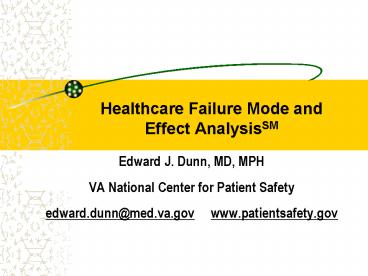Healthcare Failure Mode and Effect AnalysisSM - PowerPoint PPT Presentation
1 / 14
Title:
Healthcare Failure Mode and Effect AnalysisSM
Description:
Healthcare Failure Mode and Effect AnalysisSM. Edward J. Dunn, MD, MPH ... parameter to fit patient physiological condition and replace electrodes with ... – PowerPoint PPT presentation
Number of Views:55
Avg rating:3.0/5.0
Title: Healthcare Failure Mode and Effect AnalysisSM
1
Healthcare Failure Mode and Effect AnalysisSM
- Edward J. Dunn, MD, MPH
- VA National Center for Patient Safety
- edward.dunn_at_med.va.gov www.patientsafety.gov
2
Location in our VA NCPS Curriculum Toolkit
- Content
- Patient Safety Introduction
- Human Factors Engineering
- HFMEA ppt exercise
- Instructor Preparation
- Swift and Long Term Trust
- Selling the Curriculum
- Etc
- Alternative Education Formats
- Pt Safety Case Conference (MM)
- Pt Safety on Rounds (Modulettes)
- HFMEA participation
- Etc
3
Why use prospective analysis?
- Aimed at prevention of adverse events
- Doesnt require previous bad experience (patient
harm) - Makes system more robust
- JCAHO requirement
4
JCAHO Standard LD.5.2Effective July 2001
Leaders ensure that an ongoing, proactive program
for identifying risks to patient safety and
reducing medical/health care errors is defined
and implemented.
- Identify and prioritize high-risk processes
- Annually, select at least one high-risk process
- Identify potential failure modes
- For each failure mode, identify the possible
effects - For the most critical effects, conduct a root
cause analysis
5
Who uses failure mode effect analysis?
- Engineers worldwide in
- Aviation
- Nuclear power
- Aerospace
- Chemical process industries
- Automotive industries
- Has been around for over 40 years
- Goal has been, and remains, to prevent accidents
from occurring
6
Healthcare Version - HFMEASM
- Combines
- Traditional Failure Mode Effect Analysis
- Hazard Analysis and Critical Control Point
- VA Root Cause Analysis
- Adapted and Tested in Healthcare Settings
- 163 VA hospitals (with some success)
- Still a complex process/time commitment (see NIH)
7
The Healthcare Failure Mode Effect Analysis
Process
Step 1- Define the Topic
Step 2 - Assemble the Team
Step 3 - Graphically Describe the Process
Step 4 - Conduct the Analysis
Step 5 - Identify Actions and Outcome Measures
8
HFMEATM Hazard Scoring Matrix
9
HFMEATM Decision Tree
10
ICU Alarm Example
11
ICU Alarm Example
12
ICU Alarm Example
13
Blow-up of One Line
Failure Mode 3B1a - Crucial Alarm Ignored and
Patient Decompensated
Failure Mode Cause
Outcome Measure
Action
Severity
Frequency
14
HFMEA RCA
Differences
Similarities
- Preventive v. reactive
- Analysis of Process v. chronological case
- Choose topic v. case
- Prospective (what if) analysis
- Detectability Criticality in evaluation
- Emphasis on testing intervention
- Interdisciplinary team
- Develop flow diagram
- Systems focus
- Actions Outcome measures
- Scoring matrix (severity/probability)
- Triage questions, cause effect diag.,
brainstorming































